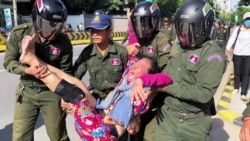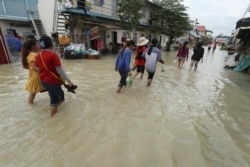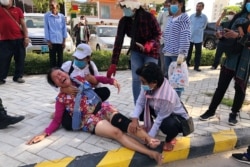On October 24, during flood relief efforts in northwestern Cambodia last weekend, Cambodian Prime Minister Hun Sen turned his attention toward an unnamed opposition group, which he accused of violently seeking power through a “color revolution.”
Claiming “the opposition never had an honest will to unify, only to destroy,” Hun Sen declared that he had no need for political negotiation.
“Those who break the law have to deal with the court, and they need to first serve a prison sentence. After that, we can talk. You can form a political party after serving a jail term; that’s your right,” he said.
“I only have the ability to stop wars and armed conflicts. But I don’t have the ability to become a preacher to teach a group who attempt to destroy the nation with a color revolution.”
The suggestion of an impending color revolution in Cambodia is false.
Hun Sen’s comments followed the assault against a senior member of the banned opposition Cambodia National Rescue Party (CNRP) on October 19. The victim, party Secretary General Din Varin, was one of at least 10 CNRP activists and officials to have been attacked since late 2019, Radio Free Asia reported.
Hun Sen also recently issued a veiled threat against the wife of CNRP member Ho Vann, currently exiled in the United States, for allegedly organizing a protest outside the Chinese embassy in Phnom Penh on October 23. That protest was sparked by alleged plans to build a Chinese military base on Cambodian soil, in contravention of the country’s national charter.
On Tuesday, three other CNRP members were charged with the crime of “incitement” for their alleged role in organizing that demonstration.
Hun Sen’s allegations regarding a ‘color revolution’ likely stem from the ongoing treason trial of opposition leader Kem Sokha, a trial that United Nations experts have called “politically motivated.”
Kem Sokha, 66, was arrested in September 2017 for an alleged foreign-backed plot to overthrow Hun Sen, who has ruled Cambodia for 35 years. He faces up to 30 years in prison if convicted.
The New York-based Human Rights Watch called the case against him “fabricated,” claiming the only evidence presented prior to the trial was “a highly edited video” of Kem Sokha speaking to supporters in Australia in 2013.
In that video, Kem Sokha expressed his desire for political change in Cambodia with the help of foreign experts. As noted by rights group Amnesty International, “there is no suggestion of violence or the use of force in the video excerpt.”
Other evidence presented at the trial by the prosecution was footage from 2013 of former U.S. Rep. Ed Royce, a California Republican, praising Kem Sokha for his use of nonviolence in seeking democratic reform.
During that event in Long Beach, California, Kem Sokha said he had “been supported by the U.S. government to train in democratic practices for five years,” adding those gains had made “Cambodian people stand up.”
At the trial, government lawyers questioned what Sokha meant by “stand up,” to which he replied: “Stand up here means people understand about democracy and human rights.”
While Cambodia is nominally a democracy, state-sponsored intimidation and arrests have turned the country into a de facto one-party state, with Hun Sen’s Cambodia People’s Party at the helm.
Prosecutors also presented a 2012 video clip from Voice of America about the formation of the CNRP, video footage from a 2013 post-election labor protest, and anonymous accusations from an anti-CNRP group on Facebook claiming a former International Republican Institute employee had offered to help Kem Sokha’s daughter study in the United States.
How any of the above evidence substantiates the government’s treason case is unclear.
The United Nations Working Group on Arbitrary Detention noted that Kem Sokha’s prosecution had “clearly resulted from the exercise of his right to take part in the government of his country” and his right to “freedom of expression and opinion,” in violation of the Universal Declaration of Human Rights.
The U.S. embassy in Cambodia rejected Hun Sen’s claims that the United States was attempting to overthrow his government, calling them "inaccurate, misleading and baseless."
In March, the U.S. ambassador to Cambodia, Patrick Murphy, noted that embassy staffers had been observing the trial proceedings. Murphy expressed concern that prosecutors had “introduced theories about the U.S. into the courtroom.”
“My government has made it abundantly clear the U.S. has never sought to interfere in Cambodia’s governance and we fully support Cambodia’s independence and sovereignty,” he told reporters outside the courtroom in March, shortly before the trial was suspended due to the COVID-19 pandemic.
Kem Sokha’s 2017 arrest came several months after the CNRP managed to secure 44.2% of the vote in local elections, despite conditions deemed “hostile to free speech and genuine political participation” by Human Rights Watch.
Following a lawsuit initiated by the government, the Supreme Court of Cambodia ruled to dissolve the CNRP in November of that year.
The dissolution was described as “the final nail in the coffin for Cambodian democracy” by Charles Santiago, chairperson of the Parliamentarians for Human Rights at the Association of Southeast Asian Nations.








